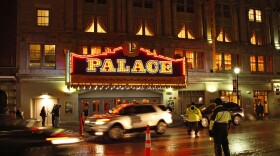It was a battle of dueling economic reports before the state legislature Thursday as lawmakers considered whether to commission yet another study on the impact of a potential third casino.
The Commerce Committee held a public hearing on a bill that would require them to seek more data before moving forward with plans for a casino in north-central Connecticut.
But several reports have already been produced: two by the tribal partnership backing the casino, and one, revealed last week, but MGM Resorts, which is building a casino in Springfield.
MGM’s study, compiled by Oxford Economics, said the best economic impact for Connecticut would come from building a casino in the Bridgeport area.
The partnership between the Mashantucket Pequot Tribe and the Mohegan Tribe, called MMCT, is working with the state to develop the project. It prefers to site in north-central Connecticut, as a way to draw customers away from the Springfield facility.
The partnership's reports were produced by Dr. Clyde Barrow of the University of Texas. He gave evidence to the committee, telling him the studies are not comparable.
"We have real data about where customers come from in Connecticut and how much they spend," Barrow said. "That's data that Oxford Economics doesn't have access to, and as a result their analysis, I would claim, is really purely speculative."
Barrow also said the two are based on completely different scenarios. The tribal partnership is proposing a $300 million facility.

The data for Oxford's recommended outcome, a Bridgeport-area casino, is based on a $1.1 billion facility.
"They're essentially talking about replicating Mohegan Sun, an analysis based on an assumption that's four times bigger than what's being proposed," Barrow said.
But not everyone agreed that there’s enough information already out there.
Fred Carstensen, an economist at UConn is in favor of a new study. He said that while he recognizes the positive impact the existing casinos have had on the state's economy, he has grave concerns about the third casino plan.
"We have not had any kind of an exhaustive study," he said. "We don't know what the implications are. My bottom line is that I actually think that the small casino idea not only may fail, in terms of either job preservation or revenues to the state, it may in fact become a zombie."
By which he means it will end up cannibalizing revenues from the two existing casinos, while the state continues to lose gaming customers to facilities in Massachusetts.
Some lawmakers questioned the potential social costs of expanded gaming in Connecticut, noting that the existing studies commissioned by the gaming giants don't touch on what the state may have to spend to mitigate problem gambling, crime and other issues.
MGM is also in favor of more study of the Connecticut proposal, despite having commissioned its own report. The gaming company has filed a lawsuit against the state, claiming it should open the potential casino development to outside bids.
MGM has also backed a second lawsuit by the Schaghticoke Tribe in Kent, who would also like to be allowed to bid.
Executive Vice President Alan Feldman told the committee, "Connecticut jobs absolutely matter. It is in no-one's interest to see that harmed. But there is a process in place that doesn't allow us to participate. It happens to be that we think Connecticut is a terrific market. The state needs to have its own perspective, not necessarily just what MGM thinks or what MMCT thinks."
A wide range of casino employees, small businesses and local legislators gave testimony in support of the Connecticut tribes' position, opposing any new study.





